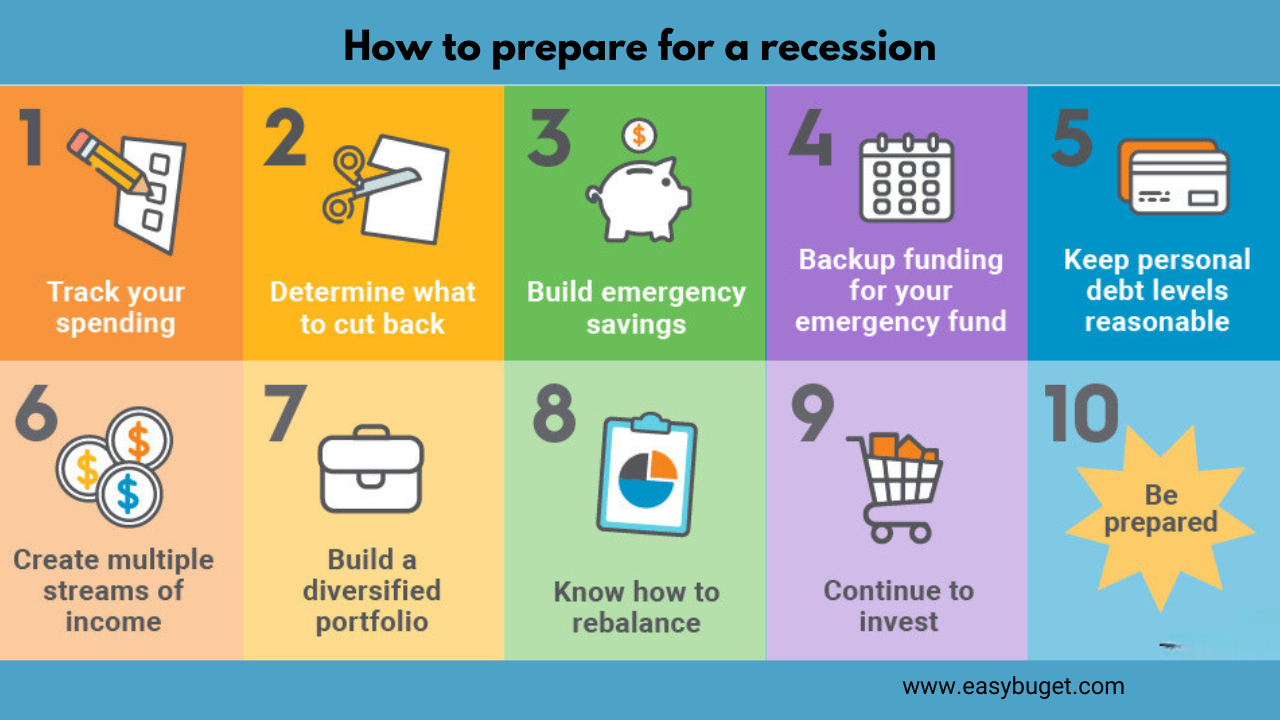Economical uncertainty is uncertain, and a recession is one of the most significant events that can impact your personal finances. Let’s face it—recessions are stressful. The thought of job losses, shrinking savings and economic uncertainty can keep anyone up at night. But here’s the thing, while you can’t control the economy, you can control how prepared you are. With the right steps, you can protect your finances and face a recession with confidence.
In this guide, I’ll walk you through a step-by-step plan to prepare for a recession. Whether you’re just starting to think about it or already taking action, these tips will help you build a solid financial safety net. Let’s get started!
What is a Recession?
A recession is when the economy slows down significantly. This slowdown impacts various aspects of the economy, including employment, production, and spending. Typically, recession last for several months, but they can vary in duration and severity. It’s important to understand that recession is a normal part of the economic cycle and they usually follow a period of economic expansion.
For everyday individuals, the effects of a recession can include job losses, reduced wages and a decrease in the value of investments. Essentially, during a recession, businesses make less money, and in turn, they reduce their workforce or cut expenses.
What is the difference between recession and Depression?
Recession
Think of a recession as a temporary but significant dip in the economy. It could be caused by various factors, including a sudden decline in consumer demand, financial crises or shifts in policy (like higher interest rates). Recession typically last for a few months to a year or so. During a recession, people experience job losses, businesses close, and stock markets dip. However, with appropriate economic intervention (like stimulus packages), recovery usually occurs.
Depression
A depression is far more severe and long-lasting. It is marked by an extended period of economic decline, often spanning years rather than months. The effects are deeper and can involve widespread unemployment, massive bankruptcies, and prolonged financial hardship. The Great Depression, which began in 1929, is the classic example of a depression that lasted for over a decade and affected many countries worldwide.
Understanding the difference is important because a recession, while tough, is not as long-lasting or devastating as a depression.
What typically happens in a recession?
During a recession, the economy experiences various challenges:
- Increased Unemployment: Businesses like retail, travel, and hospitality, may cut down on staff due to reduced consumer spending. This leads to higher unemployment rates, making it harder for people to find jobs.
- Decrease in Consumer Spending: People are less likely to make major purchases during a recession, which directly affects businesses. This can lead to a cycle of more layoffs and slower economic recovery.
- Stock Market Volatility: Investors tend to panic when they see negative economic indicators. As a result, stock markets experience sharp declines as people sell off their assets to minimize risk. This can affect individual investors’ retirement accounts and savings.
- Business Failures: Smaller businesses may not have the financial cushion needed to survive during a recession. Without steady cash flow and with reduced customer demand, many businesses could close their doors.
- Falling Property Values: In a recession, people might hold off on buying homes or invest less in property. This causes housing markets to slow down, often resulting in reduced property values and fewer transactions.
How to prepare yourself for a recession
Preparing for a recession isn’t just about saving money—it’s about positioning yourself for financial stability during challenging times. Here’s a deeper look into each strategy:
Step 1: Build an emergency fund
An emergency fund is your financial lifeline during tough times. It’s the money you set aside to cover unexpected expenses, like a job loss or medical bill.
- How much should you save? Aim for 3-6 months’ worth of living expenses. If that feels overwhelming, start with a smaller goal, like $1,000.
- Where should you keep it? Store your emergency fund in a high-yield savings account. It’s safe, earns interest, and is easy to access when you need it.
- Pro Tip: Automate your savings. Set up a monthly transfer to your emergency fund so you’re consistently building it without even thinking about it.
Step 2: Reduce your debt
Debt can feel like a heavy weight during a recession. The less you owe, the more financial freedom you’ll have.
- Focus on high-interest debt first. Credit cards and payday loans often have the highest interest rates, so tackle those first.
- Consider debt consolidation. If you have multiple debts, combining them into one lower-interest loan can make repayment easier.
- Avoid new debt. Pause unnecessary purchases on credit and stick to a budget.
Step 3: Diversify Your income
Relying on a single source of income is risky during a recession. Diversifying your income can provide stability and peace of mind.
- Start a side hustle. Freelancing, tutoring or selling handmade goods online are great options.
- Invest in passive income. Consider dividend-paying stocks, rental properties, or creating digital products like eBooks or courses.
- Upskill. Learn new skills that can make you more employable or open up new income opportunities.
Step 4: Cut unnecessary expenses
Take a hard look at your spending habits. Cutting back on non-essentials can free up cash to boost your savings or pay off debt.
- Track your spending. Use apps like Mint or YNAB to see where your money is going.
- Trim the fat. Cancel unused subscriptions, dine out less, and shop smarter by using coupons or buying in bulk.
- Focus on needs vs. wants. Ask yourself, “Do I really need this?” before making a purchase.
Step 5: Review and Adjust your investments
A recession can hit your investments hard, but a well-balanced portfolio can help you weather the storm.
- Diversify your investments. Don’t put all your eggs in one basket—spread your money across stocks, bonds, and other assets.
- Avoid panic selling. Market downturns are temporary and selling during a dip can lock in losses.
- Consult a financial advisor. If you’re unsure about your investment strategy, seek professional advice.
Step 6: Boost your job security
In uncertain times, it’s smart to make yourself indispensable at work.
- Excel in your role. Go above and beyond to show your value to your employer.
- Expand your skills. Take online courses or certifications to make yourself more versatile.
- Network. Build relationships within your industry so you have a support system if you need to find a new job.
Step 7: Stock up on essentials
During a recession, prices for everyday items can rise. Stocking up on essentials can save you money in the long run.
- Buy non-perishable items. Think canned goods, toiletries and cleaning supplies.
- Shop sales and use coupons. Stock up when items are discounted.
- Don’t overdo it. Only buy what you’ll actually use to avoid waste.
Step 8: Protect your credit score
A good credit score can be a lifesaver during tough times, especially if you need to take out a loan or refinance.
- Pay bills on time. Late payments can hurt your score.
- Keep credit card balances low. Aim to use less than 30% of your available credit.
- Check your credit report. Look for errors and dispute them if necessary.
Step 9: Stay informed but avoid panic
It’s important to stay updated on economic trends, but don’t let fear drive your decisions.
- Follow trusted news sources. Stick to reputable outlets for accurate information.
- Limit exposure to doom-and-gloom headlines. Too much negativity can lead to unnecessary stress.
- Focus on what you can control. Instead of worrying about the economy, focus on taking actionable steps to protect yourself.
Step 10: Create a long term financial plan
Preparing for a recession isn’t just about surviving—it’s about thriving in the long run.
- Set financial goals. Whether it’s buying a home, retiring early or starting a business, having clear goals keeps you motivated.
- Review your budget regularly. Make adjustments as needed to stay on track.
- Stay disciplined. Even when times are good, stick to your financial plan to build lasting security.
Mistakes to Avoid During a Recession
Even with the best preparation, it’s easy to make some common mistakes during a recession:
- Panic Selling Investments: If the stock market crashes, it is tempting to sell off investments in a rush to avoid further losses. However, selling in a panic often locks in your losses. Instead, focus on long-term goals, and don’t let short-term volatility dictate your actions.
- Neglecting Your Emergency Fund: It’s tempting to dip into your emergency fund for non-essential expenses during tough times. However, your emergency fund should be used only for true emergencies like medical bills, essential home repairs, or temporary unemployment. Keep this money intact so it can help you when you truly need it.
- Ignoring Your Debt: You may be tempted to stop paying off your debt if you are financially stressed during a recession. But neglecting debt can hurt your credit score and lead to higher interest payments in the future. Prioritize paying off high-interest debts first, such as credit cards, to avoid accumulating more financial stress.
- Cutting Back Too Much: While it’s important to reduce expenses, be careful not to sacrifice too much. For example, avoiding preventative medical care or skipping meals to save money can hurt your health. Balance your budget cuts with your well-being, and ensure you’re still living a healthy, sustainable lifestyle.
Conclusion
Recessions are a natural part of the economic cycle, but they don’t have to derail your life. By following these steps, you can protect your finances, reduce stress, and come out stronger on the other side.
Remember, preparation is key. Start today—even small actions can make a big difference.
What’s your #1 tip for preparing for a recession? Share it in the comments below! And don’t forget to subscribe for more practical financial advice.
Please subscribe Easy Budget to stay updated about our latest blogs!


1 thought on “How to prepare for a recession: A financial survival guide 2025”